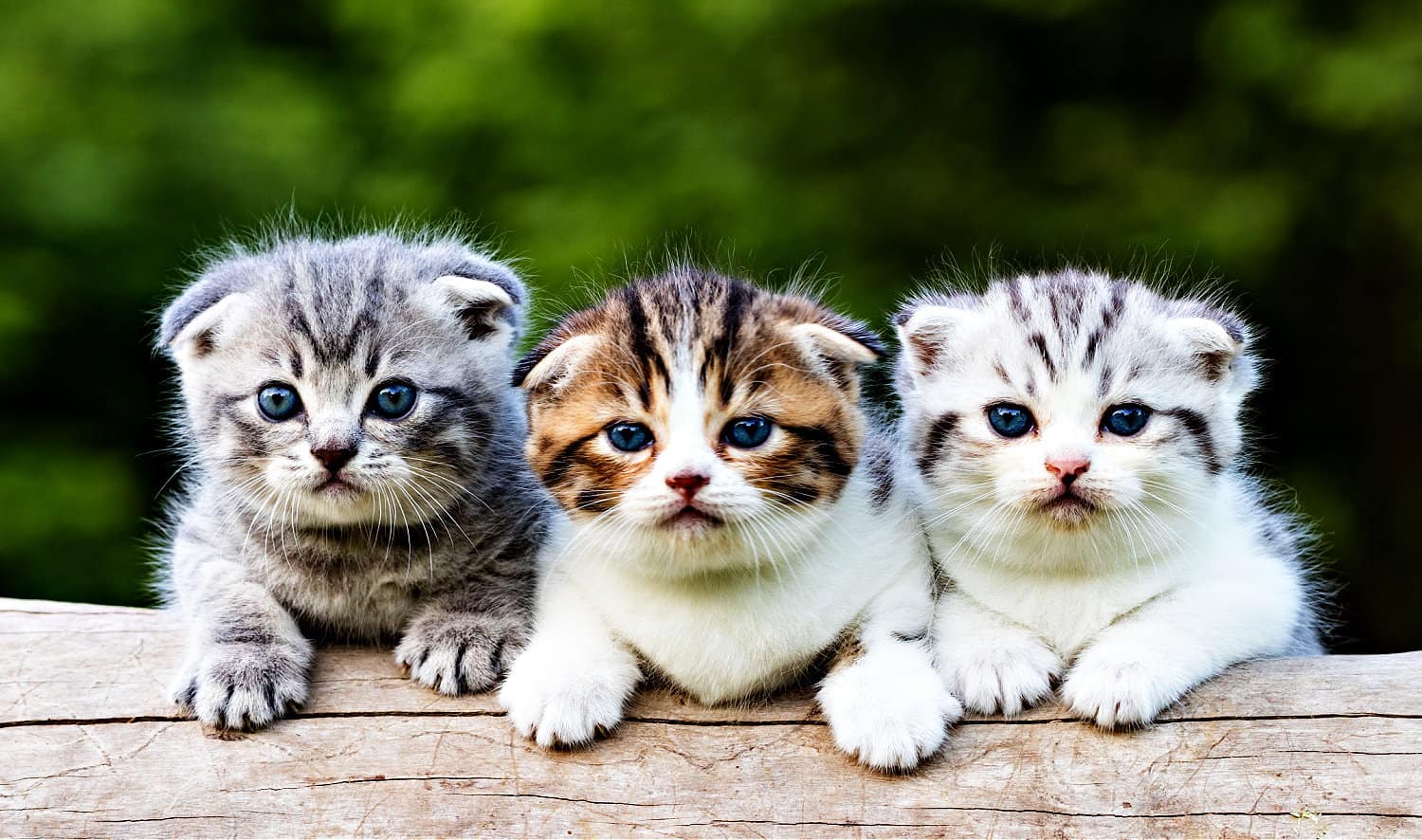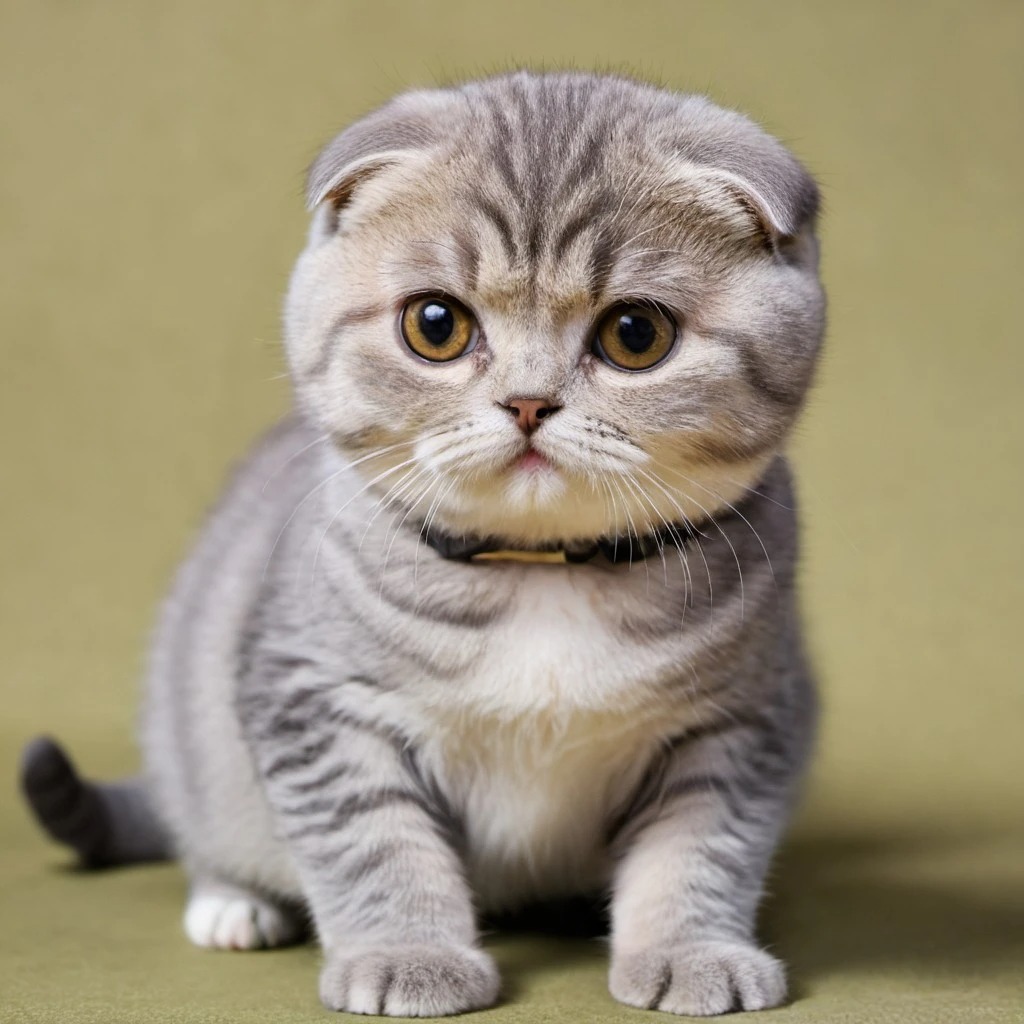Everything You Need To Know About Scottish Fold Cats
Scottish Fold cats are famous for their unique folded ears and sweet personalities. Here’s everything you need to know about this lovable breed.
Mar 19, 20258.8K Shares200K Views
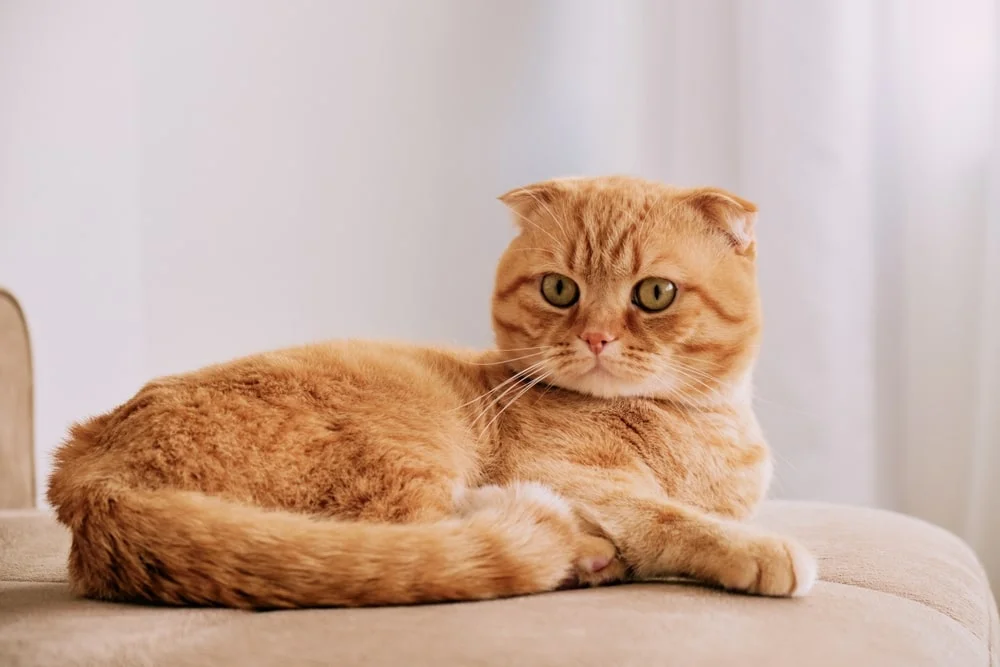
The Scottish Foldcat, instantly recognizable for its unique folded ears and round face, has gained widespread popularity among cat lovers worldwide. Known for its sweet nature and distinctive appearance, this breed’s endearing qualities often make it an ideal companion.
However, with such charm comes a set of specific care needs and potential health concerns that prospective owners should be aware of.
This guide aims to provide you with a comprehensive overview of the ScottishFold cat’s history, physical traits, personality, care requirements, and health considerations, helping you decide if this fascinating breed is right for you.
The Origins And History Of Scottish Fold Cats
The story of the Scottish Fold begins in 1961 on a farm near Coupar Angus in Tayside, Scotland. A white barn cat named Susie, with an unusual fold in her ears, caught the attention of local farmers. This spontaneous genetic mutation, affecting the cartilage in her ears, would soon give rise to a unique breed.
William Ross and his wife, Molly, recognized the unusual appearance and began breeding Susie's kittens. This early breeding program revealed that the folded ear trait was inherited as a dominant gene. In 1966, the breed was registered with the Governing Council of the Cat Fancy (GCCF)in the UK.
However, concerns soon arose regarding potential health issues associated with the folded ear gene. The GCCF stopped registering the breed in the 1970s due to concerns about potential health issues such as ear infections and deafness. Despite this, the Scottish Fold gained popularity in other countries, particularly in the United States.
The breed's growing popularity led to increased breeding efforts, often without a full understanding of the genetic implications. This has resulted in significant ethical debates surrounding the breeding of Scottish Folds. Many organizations, including the GCCF and the Fédération Internationale Féline (FIFe), do not recognize the breed due to concerns about the welfare of the cats.
Breed Profile Table
| Attribute | Details |
| Temperament | Good-natured, Sweet-Natured, Adaptable, Placid, Devoted, Easygoing, Affectionate, Quiet, Playful |
| Origin | Scotland |
| Mass | 4 – 6 kg (Male), 2.7 – 4 kg (Female) |
| Average Height | 9-12 inches tall (at the shoulder) |
| Life Expectancy | 14-16 years |
| Other Names | Scot Fold |
| TICA Status | Standard |
| Coat Length | Short-haired or long-haired, depending on individual |
| Eye Colors | Blue, green, copper, gold, hazel, or odd-eyed (two different colors) |
Distinctive Characteristics Of Scottish Fold Cats
The Scottish Fold is instantly recognizable by its unique folded ears. This distinctive trait, caused by a genetic mutation affecting cartilage, gives the cat an "owl-like" appearance. While some kittens are born with folded ears, others may have straight ears.
Beyond their folded ears, Scottish Folds possess several other charming physical characteristics:
- Rounded Appearance:They have a rounded head, short nose, and large, round eyes, contributing to their overall "sweet expression."
- Coat Variations:They come in a wide array of coat types, including short-haired, long-haired (often referred to as Highland Folds), and semi-longhair.
- Color and Pattern Diversity:Scottish Folds exhibit a remarkable range of colors and patterns, from classic tabby to striking bicolor and even the elegant pointed patterns of Siamese cats.
- Size: Typically, Scottish Folds weigh between 6 to 13 pounds, with males being slightly larger than females. They are well-proportioned, with muscular builds and bushy tails that add to their charm.
Beyond their physical appearance, Scottish Folds are known for their gentle and affectionate personalities. They are often described as:
- Loving and Playful:These cats are among the best companion animals, enjoying interaction with their human companions and often engaging in playful antics.
- Quiet and Gentle:They tend to be relatively quiet and rarely vocalize excessively.
- Social and Adaptable:Scottish Folds generally thrive in social environments and can adapt well to various living situations, including households with children and other pets.
Some unique behaviors observed in Scottish Folds include:
- "Buddha Sit":They often enjoy "flopping" on their backs while relaxing, a behavior affectionately referred to as the "Buddha Sit."
- "Otter-like" Sitting Position:They sometimes sit upright on their hind legs, resembling an otter.
Health Implications Of The Folded Ears
While the folded ears contribute to the breed's charm, they are also linked to a genetic disorder called osteochondrodysplasia. This condition causes cartilage abnormalities and can lead to painful joint issues, such as arthritis, and spinal deformities.
Caring For A Scottish Fold Cat
Caring for a Scottish Fold requires a thoughtful and informed approach, considering their unique needs and potential health concerns.
Grooming Needs
- Regular Brushing:Regular brushing is essential to maintain coat health and prevent matting. Short-haired Scottish Folds typically require brushing once or twice a week, while long-haired varieties may need more frequent brushing (three to four times a week).
- Ear Cleaning:While the folded ears may appear challenging to clean, gentle cleaning with a veterinarian-approved ear cleaner is important to prevent ear infections.
- Nail Trimming:Regular nail trimming is crucial to prevent scratching furniture and to maintain overall comfort.
- Dental Care:Daily dental hygiene is essential for all cats, including Scottish Folds. Regular brushing with cat-specific toothpaste and toothbrushes can help prevent dental disease.
Dietary Requirements
- High-Quality Nutrition:Providing a high-quality, balanced diet is crucial for their overall health.
- Fresh Water:Ensure constant access to clean, fresh water.
- Portion Control:Maintaining a healthy weight is crucial, especially for Scottish Folds, as obesity can increase the risk of joint problems and other health issues.
Exercise And Enrichment
- Playtime:Engage your Scottish Fold in interactive play sessions with toys such as wand toys, puzzle feeders, and catnip mice.
- Climbing Opportunities:Provide opportunities for climbing and exploration by offering cat trees, shelves, and scratching posts.
- Creating a Comfortable Environment:Ensure easy access to food, water, and litter boxes. Providing comfortable resting spots and cozy beds will enhance their well-being.
To get a more in-depth guide on keeping your Scottish Fold healthy, check out this helpful video.
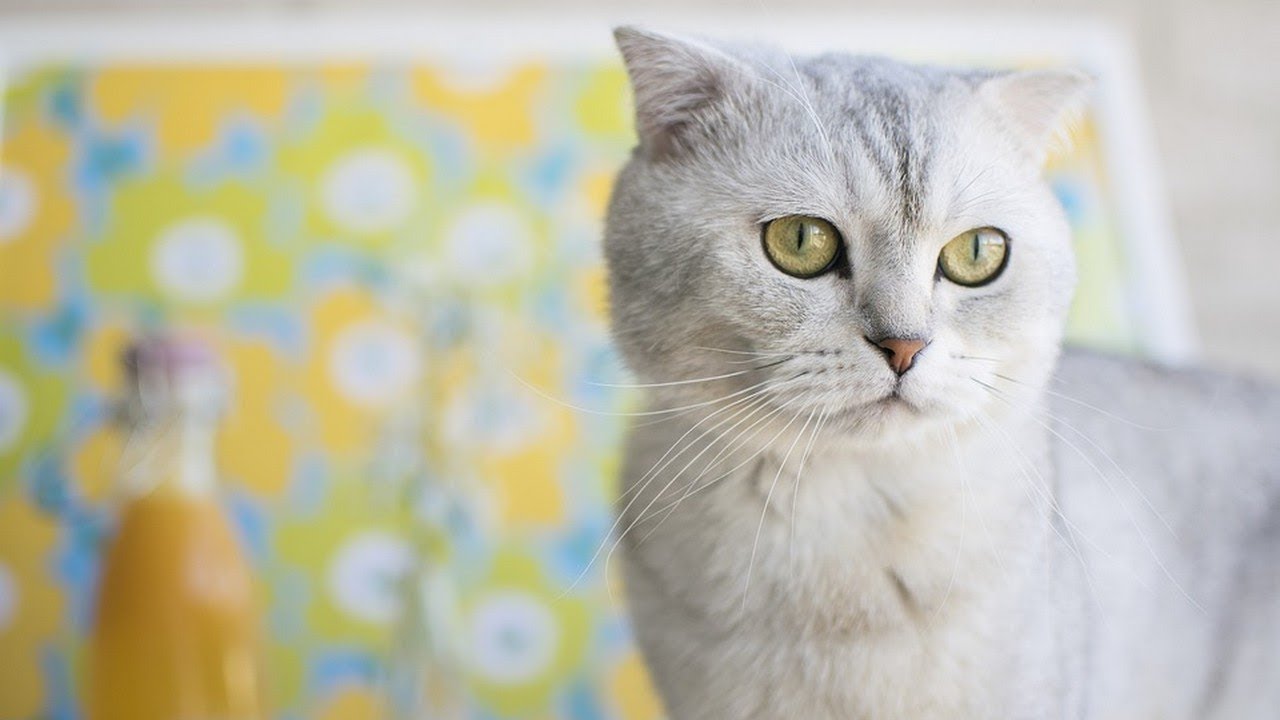
How to Take Care of a Scottish Fold - Keeping Your Cat Healthy and Clean
Health Issues And Considerations
While Scottish Folds are generally healthy, they are prone to certain genetic health problems due to the mutation responsible for their folded ears.
Osteochondrodysplasia (Scottish Fold Disease): The mutation that causes the characteristic folded ears also affects cartilage formation throughout the body, leading to osteochondrodysplasia.
This condition results in painful joint abnormalities, arthritis, and spinal issues, which can severely affect mobility and quality of life. Cats with two copies of the mutation are more likely to experience severe symptoms early in life.
Hypertrophic Cardiomyopathy: This heart condition is more common in Scottish Folds and can cause thickening of the heart muscle, leading to heart failure. Regular veterinary check-ups are essential to monitor heart health.
Polycystic Kidney Disease: Scottish Folds may also be at an increased risk of developing kidney disease, so it’s important to monitor kidney function and manage diet appropriately.
Diabetes: Scottish Folds are prone to obesity, which can increase the risk of diabetes. Ensuring your cat maintains a healthy weight is essential to avoid this condition.
Other Health Concerns: Like all cats, Scottish Folds can be susceptible to respiratory infections, urinary tract issues, and parasites. Routine check-ups and vaccinations are crucial to prevent and address these common health problems.
Health Concerns Overview
| Health Issue | Symptoms |
| Osteochondrodysplasia | Stiff legs, arthritis, lameness, pain |
| Diabetes | Excessive thirst, urination, weight loss, lethargy |
| Heartworm | Lethargy, coughing, difficulty breathing |
| Flea/Tick Infestation | Scratching, hair loss, visible fleas or ticks |
Health Management
Due to their unique health risks, managing a Scottish Fold's health requires attention to detail and regular veterinary visits.
- Regular Vet Visits: Early detection of genetic conditions like osteochondrodysplasia can help manage symptoms before they become debilitating. Routine check-ups are also important to monitor heart health and kidney function.
- Pain Management for Arthritis: If your Scottish Fold develops arthritis, pain management strategies such as joint supplements, pain medication, or changes in lifestyle (like limiting jumping or climbing) can help improve their quality of life.
- Preventative Care: Heartworm prevention is essential, especially for indoor-outdoor cats, as heartworm disease can affect both types of cats. Discuss a suitable preventative regimen with your vet.
Diet And Feeding
Feeding your Scottish Fold a balanced diet is crucial for maintaining their health, especially to avoid obesity and the related risk of diabetes.
- Recommended Diet: Provide a high-quality, nutritionally balanced diet that supports joint health and overall well-being. Cats with osteochondrodysplasia may benefit from supplements like glucosamine or omega-3 fatty acidsto support cartilage health.
- Portion Control: Overfeeding can lead to obesity, so it’s important to measure food portions and avoid free-feeding. Offering multiple small meals throughout the day can help regulate their weight.
- Supplements for Joint Health: Joint health supplements may help slow the progression of arthritis in Scottish Folds with osteochondrodysplasia. Always consult with your vet before adding supplements to their diet.
How To Choose A Scottish Fold
When considering adding a Scottish Fold to your family, it’s essential to choose a reputable breeder or adoption center. Look for breeders who health-test their cats and adhere to ethical breeding practices to minimize the risk of genetic health issues.
- Health Testing: Ensure that the breeder tests for osteochondrodysplasia and other genetic conditions before breeding. Ethical breeders prioritize the health and well-being of the breed.
- Selecting the Right Cat: Choose a Scottish Fold whose temperament aligns with your lifestyle. These cats thrive in homes where they receive plenty of attention, so make sure you have time to devote to your new companion.
Common Mistakes Scottish Fold Cat Owners Make
Before diving into the list of common mistakes, watch this video for an overview of what to avoid as a Scottish Fold cat owner.
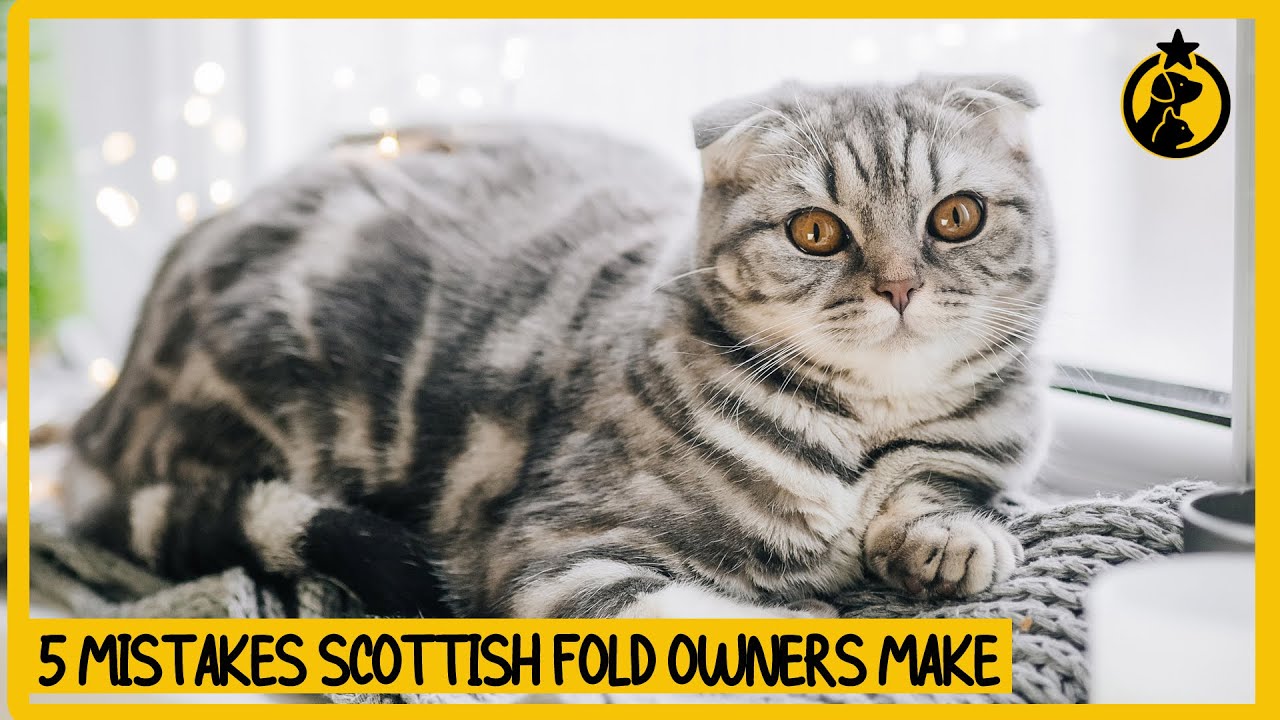
5 Common Mistakes Scottish Fold Cat Owners Make
Scottish Fold cats are wonderful companions, but owners need to avoid certain pitfalls to ensure their well-being. Here are the most common mistakes:
1. Ignoring Genetic Health Risks
Mistake: Not considering the genetic condition (osteochondrodysplasia) that affects cartilage, leading to arthritis and deformities.
Solution: Choose a reputable breeder who tests for health issues, and regularly monitor for joint pain or stiffness.
2. Overfeeding And Obesity
Mistake: Overfeeding your cat, which can lead to obesity, diabetes, and joint issues.
Solution: Control portions, avoid free-feeding, and ensure regular exercise.
3. Neglecting Joint Health
Mistake: Failing to manage arthritis and joint problems due to the genetic condition.
Solution: Offer joint supplements, and provide ramps or low furniture to help with movement.
4. Lack Of Social Interaction
Mistake: Not providing enough social interaction or mental stimulation.
Solution: Spend quality time with your cat, and consider getting another pet if you’re away often.
5. Skipping Vet Check-ups
Mistake: Not scheduling routine vet visits to monitor health.
Solution: Regular check-ups are essential to detect and address health issues early.
6. Neglecting Grooming
Mistake: Forgetting regular grooming, especially for long-haired Scottish Folds.
Solution: Brush long-haired cats 3-4 times a week and short-haired cats once or twice a week.
7. Declawing
Mistake: Considering declawing as a solution for scratching.
Solution: Avoid declawing; provide scratching posts and trim nails regularly.
8. Not Preparing For Health Costs
Mistake: Underestimating the financial and emotional commitment needed for managing health issues.
Solution: Prepare for potential vet costs, especially for joint care and long-term conditions.
Pros And Cons Of Owning A Scottish Fold
Pros:
- Friendly and affectionate nature, making them great family pets.
- Low-maintenance grooming (for short-haired Folds).
- Adaptable to different living environments and companions.
Cons:
- Genetic health issues, particularly osteochondrodysplasia, leading to potential joint pain and mobility problems.
- Higher veterinary costs due to their health needs.
- Ethical concerns surrounding breeding practices for folded ears.
Read Also: 5 Top Scottish Experiences You Need To Try
FAQs About Scottish Fold Cats
Are Scottish Fold Cats Hypoallergenic?
No, Scottish Folds are not hypoallergenic.
How Long Do Scottish Fold Cats Live?
The average lifespan of a Scottish Fold is 14-16 years, but this can vary depending on individual health and care.
Do Scottish Fold Cats Require Special Grooming?
While not hypoallergenic, regular grooming is essential to maintain coat health and prevent matting.
Can Scottish Fold Cats Live With Other Pets?
With proper socialization, Scottish Folds can generally coexist peacefully with other cats, dogs, and even children.
How Expensive Is A Scottish Fold Cat?
The cost of a Scottish Fold kitten can vary significantly depending on the breeder, the kitten's lineage, and the breeder's location. Prices can range from $1,000 to $5,000 or more.
Conclusion
The Scottish Fold is a delightful breed with a unique look and a loving temperament. However, potential owners should be aware of the breed’s health challenges, especially regarding osteochondrodysplasia.
If you’re willing to invest in their care and are ready to manage their health issues, a Scottish Fold can make a wonderful and loyal companion for many years.
You Might Like: Scotland Travel Guide & Top Destinations You Can’t Miss
Jump to
The Origins And History Of Scottish Fold Cats
Breed Profile Table
Distinctive Characteristics Of Scottish Fold Cats
Caring For A Scottish Fold Cat
Health Issues And Considerations
Health Management
Diet And Feeding
How To Choose A Scottish Fold
Common Mistakes Scottish Fold Cat Owners Make
Pros And Cons Of Owning A Scottish Fold
FAQs About Scottish Fold Cats
Conclusion
Latest Articles
Popular Articles
